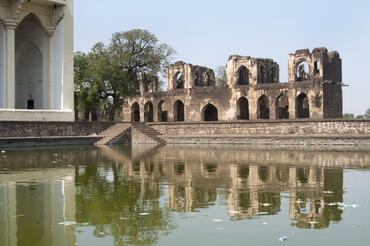This event is took place virtually on September 25, 2020, at 9:00 am (EST). See below for more information on the discussion, including the event description and speaker information.
Event Description
On September 25 at 9 AM EST // 6:30 PM India Standard Time, join Amita Baig, Executive Director of World Monuments Fund India, and Rana Safvi, prolific author and translator specializing in the culture, history, and monuments of India, for a spotlight event on the historic city of Bijapur and the unique water systems which allowed its millions of inhabitants to thrive in the searing heat of the Deccan Plateau.
As the global water crisis looms, the reactivation of historic water systems and the updating of traditional practices can make a helpful contribution to the challenge. At the same time, it can contribute to changing our water consciousness and help activate a new ethic of care and conservation. The Traditional Water Systems of the Deccan Plateau were included on the 2020 World Monuments Watch to illustrate the potential for historic water systems to help address the water crisis for contemporary communities.
The event will include a visual presentation by Rana Safvi and discussion with Amita Baig, followed by a Q&A session. Participants will have the opportunity to submit questions via the platform or social media.
About Bijapur and the Historic Water Systems of the Deccan Plateau

The Historic Water Systems of the Deccan Plateau have a unique characteristic in that they are directly inspired by the Persian Qanats.
The system is based on a network of channels connected to water tanks each feeding the other. In the searing heat of the Deccan Plateau, this was a lifeline for any settlement but more especially for the survival of the fortified city. Water conservation was inbuilt and Bijapur in its day was a flourishing city known for its great syncretic culture. At its zenith it had a community of over 14,500,000 people.
Today the city of some 3,500,000 still hosts some of India’s most unique monuments. But the underground channels have been compromised. The restoration of the Taj Bawdi water system will not only address the building fabric but the water resource itself as a pilot project for Bijapur to showcase the potential of recovering the much larger water system in the city.
The Bijapur Sultans were a strong force in the fifteenth and sixteenth century. They decimated the immense Vijaynagar Empire and remained a thorn in the Mughal Empire as they were never conquered. The massive fortifications and the necropolis remain today mute witness to a rich and vibrant cultural legacy.